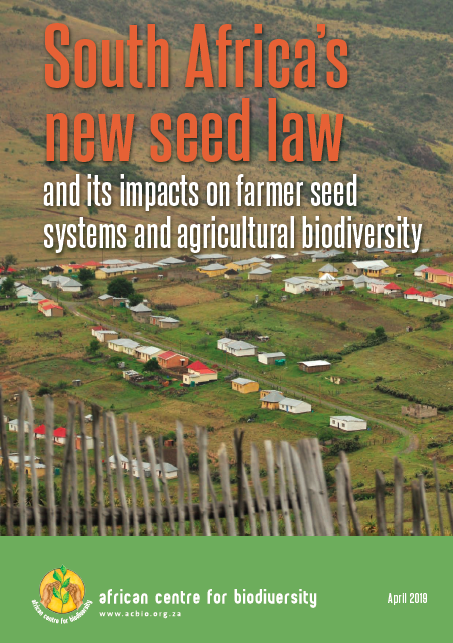Latest Resources

26 July 2019
Gene Drive Organisms in Africa: Civil Society Speaks Out
On Monday 1st July 2019, Target Malaria announced the release of 6400 genetically modified (GM) sterile male mosquitoes in Bana, a village in Burkina Faso – the first GM insects to be released in Africa. This is Phase I – by Phase III, Target Malaria aims to release gene drive mosquitoes. Gene drives are based […]

23 July 2019
Moving from the Farm Input Subsidy Programme (FISP) to Agroecology in the Kalulushi District, Cop...
This briefing highlights key issues raised at a farmer exchange and learning event held in May 2019 in Kalulushi District, in the Copperbelt Province of Zambia. The overall objective of the meeting was to share and exchange ideas on transitioning to a smallholder support system for diversified agroecological farming. Participants discussed the roles that farmers, […]

8 July 2019
Seed and gene banks play a critical role in conserving and sharing indigenous crop seeds
On a trip to Harare for partnership exploration meetings, the African Centre for Biodiversity visited the Genetic Resources and Biotechnology Institute of Zimbabwe. Gene banks such as these are primarily established to conserve the genetic resources that form the basis for all food production. Seed collections start at the level of community seed banks and […]

5 July 2019
Post Cyclone Idai: Farming practices for resilience to withstand extreme weather events
Ranked as one of the worst tropical storms to hit Africa, Cyclone Idai made landfall in central Mozambique on 15 March, before moving on to Malawi and Zimbabwe. The district of Chimanimani in Zimbabwe was one of the worst-hit areas. On a recent trip to Zimbabwe, ACB spoke to representatives of three organisations that work […]

13 May 2019
Gene drive organisms: What Africa should know about actors, motives and threats to biodiversity a...
The African Centre for Biodiversity (ACB) has produced a briefing paper in regard to a new and controversial genetic engineering (GE) technology to produce gene drive organisms (GDOs). These GDOs have been specifically designed to spread an engineered, ‘modified’ genetic trait such as sterility, with the potential to eradicate entire wildlife populations and even species. […]

30 April 2019
Oxitec’s failed GM mosquito releases worldwide: Forewarnings for Africa and the Target Malaria pr...
A decade ago, genetically modified (GM) mosquitoes were first released globally, in the Cayman Islands, by UK-based company Oxitec. Further releases followed in Malaysia, Panama and Brazil. In a public relations whitewash, Oxitec has repeatedly claimed that the experiments successfully wiped out nearly 90% of the Aedes aegypti mosquito population, which is one of the […]

23 April 2019
South Africa’s new Plant Breeders’ Rights Act and its effect on farmers’ rights and farmer manage...
In this updated briefing, the African Centre for Biodiversity (ACB) warns that the Plant Breeder’s Rights Act (PBR) 2018 will impact negatively on small-scale farmers and calls for exemptions in the Regulations to protect farmers’ rights. The PBR, together with the new Plant Improvement Act (PIA) 2018, was approved by Parliament last October and has […]

23 April 2019
South Africa’s new seed law and its impacts on farmer seed systems and agricultural biodiversity
In this updated briefing, the African Centre for Biodiversity (ACB) reflects on how the new Plant Improvement Act (PIA) 2018 will further undermine the rights of small-scale farmers while expanding the rights of the corporate agricultural sector, further entrenching its domination. The PIA, together with the new Plant Breeder’s Rights Act (PBR) 2018, was approved […]

16 April 2019
Agroecology as an alternative (Video four of a four-part series)
In August 2018, the Rural Women’s Assembly (RWA) and the African Centre for Biodiversity (ACB) hosted a speak-out for SADC smallholder farmers in Windhoek, Namibia, on Farm Input Subsidy Programmes (FISPs). FISPs are government agricultural programmes that promote Green Revolution inputs produced by multinational corporations, such as chemical fertilizers. In Ghana, for example, up to […]

20 March 2019
Alternatives to FISP: Farm Input Subsidy Programmes in Africa
In August 2018, the Rural Women’s Assembly (RWA) and the African Centre for Biodiversity (ACB) hosted a speak-out for SADC smallholder farmers in Windhoek, Namibia, on Farm Input Subsidy Programmes (FISPs). FISPs are government agricultural programmes that promote the use of Green Revolution inputs produced by multinational corporations. These top-down packages have proven to be […]
